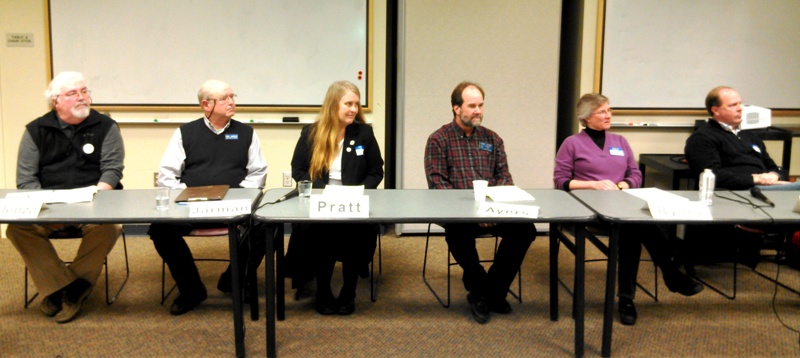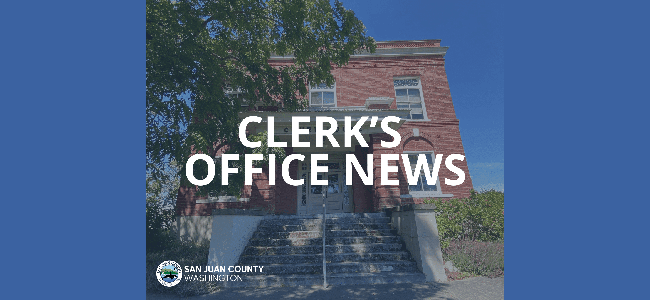
Candidates for Council positions representing San Juan Island and Orcas Island speak at the Eagle Forum. From left: Marc Forlenza, Bob Jarman, Lovel Pratt, Greg Ayers, Lisa Byers and Rick Hughes
By Margie Doyle
Candidates for the San Juan and Orcas Island County Council positions presented their views and strategies on county issues at the Eagle Forum on Saturday, January 26.
The Eagle Forum, as described on its website www.orcaseagleforum.org, is “A place for conservatives on Orcas Island to find common ground and speak to issues debated nationally, statewide, countywide, and locally. We are guided by principles set forth by the Founders in the Declaration of Independence and the U.S. Constitution. Our goal is to do what we can reasonably do, at all levels, to guide this country to its Constitutionally based foundations.”
About 50 people attended the forum at the Eastsound Fire Hall, which was moderated by Eagle Forum President Rick Boucher. After giving their opening statements, the six candidates answered questions in a rotating round robin format.
The candidates described themselves and their campaigns as follows:
Rick Hughes, Orcas business owner, husband and father, and former member of the Eastsound Planning Review Committee (EPRC) pledged to “localize” county government by expanding services beyond Friday Harbor; to simplify county laws, in part by removing the Eastsound area out of the County Comprehensive Plan and into the Uniform Development Code (UDC); and to provide better communication by making it easier for the average citizen to approach County Council and staff, (Orcas position)
Lisa Byers, executive director of the nonprofit OPAL Community Land Trust, wife and parent, and former member and chair of EPRC, promised to work to make the county diversified, vibrant and economically viable, sustaining mixed-income families and applying her past experiences to creatively solve county issues. (Orcas position)
Greg Ayers, physician, businessman, inventor/investor, husband and new home builder, and member of the Eastsound Sewer District, vowed to “protect island culture while improving island life.” He said he was focused on preventing “the disruption of the islands way of life through regulation.” (Orcas position)
Marc Forlenza, businessman, boater, husband and negotiator, renewed his opposition to the CAO and his support of new job creation through outreach to successful regional corporations. Forlenza stated that “most conflict comes from change.” (San Juan position).
Bob Jarman, business owner, husband, former Fire District Commissioner electric company employee and union representative, stated his commitment to maintain the rural environment of the county, “as much as we can,” to balance the concerns of environmentalists and property owners, and to avoid excessive land use regulations. (San Juan position).
Lovel Pratt, former County Council member and Planning Commission member, mother and wife, volunteer with the Fire Department and director of the San Juan Community Home Trust, stated her organization of local opposition to the Cherry Point Coal Terminal, her involvement in the year-round farmers market at the Brickworks, and in the anti-GMO campaign and her work representing the county at regional, state and federal levels. (San Juan position).
The first set of questions considered influences on County policy; the Cherry Point Coal Terminal; and misconduct in the County Development and Planning Department (CDPD). They will be addressed further in this article.
Further questions, regarding
- Unfair enforcement of the CAO and the costly appeal process
- The lack of an economic impact statement as part of the CAO process
- Government’s ability to restrict property owners, particularly regarding the buffers regulated by the CAO
- Candidates’ willingness to go against organized labor to control county expenses
will be reported upon in a second article to be published in Orcas Issues. (To learn more about the Eagle Forum, go to its website at www.orcaseagleforum.org)
The first question was introduced by Boucher for the Eagle Forum:
“Various non-elected groups including the Puget Sound Partnership, Eco-Net, the Friends among others, interacting with county staff and through various grants and membership selections, appear to be directly influencing County policy beyond any semblance of public input. How would you act to bring government back to fair, inclusive and open discussions of public policy?”
Hughes gave the Marine Resources Committee as an example, and suggested that fisherman and aquaculture “farmers” should be named to serve on the committee. He also brought up the county’s Lodging Tax Advisory Committee (LTAC) and the Solid Waste subcommittee, saying “active new participants” should be found, and term limits on committees should be established. “This is a new time for all of us to get involved,” Hughes said.
Byers said that as government becomes more complex, and more interest groups are vying for attention, it becomes incumbent for officials to get out to the people outside of specific interest groups. “Most people don’t have time for meetings,” Byers said. She also emphasized the importance of framing the issues, designing meetings to be “solution oriented” and to “make time for all voices to be heard.”
Ayers emphasized the importance of making the distinction between consultants and regulators in non-government entities. He spoke of “using data to make decisions and to justify reasoning.”
Pratt responded by noting that the Puget Sound Partnership is mandated by the state legislature and funded through the Environmental Protection Agency (EPA). “When the county does accept grant funding, it’s always important to do so consciously,” she said, making sure that the grants facilitate county priorities. “Going forward, we’ll be dependent on those sorts of revenue.”
Jarman dated the enactment of the Growth Management Act (GMA) as “when we lost control of county government… [The GMA] is not set for the rural environment, so it opened the door for grant funding.” He said, “It’s time to stand up on our own, and break some ties.”
Forlenza advised taking control of government away from sub-committees and NGOs [non-governmental organizations]. Funding by outside organizations, “like the Friends [of the San Juans] makes you beholden to them,” he said. Forlenza also said that the re-establishment of the power of the Council would prevent the CAO process, for example, from being as “flawed” as it was. “Direction came from the staff, instead of the Council. The Council is the boss; we make policy, they don’t.”
A question from the audience asked about the candidates’ stand on the coal terminal at Cherry Point.
Byers weighed the negative environmental impacts against the economic benefits of such an expansion, and announced her support of the concerns articulated by the Council on behalf of its citizens last fall.
Ayers stressed the importance of maintaining a “seat at the table” to affect the outcome of the proposal, which “seat” he said is particularly important given safety concerns and the terminal’s proximity to the Canadian border.
Pratt noted the “substantial risk” of the proposed project and said she led the Council in its opposition to the coal terminal “unless all potential impacts are mitigated.” She also brought up the challenge of increased vessel traffic, global warming and ocean acidification linked to the project.
Jarman announced his support of the Council’s current position as articulated last fall and added ” We need to keep our voice,” as citizens of the San Juan Islands.
Forlenza said he was in agreement with Ayers’ summation, and that he supports the Council’s letter. He added that as a negotiator with Royal Dutch Shell, he knows “the tricks and tragedies that can happen.” He has written the Department of Ecology and Army Corp of Engineers, while “knowing how powerful corporations are.”
“Let’s get ready,” Forlenza concluded.
Hughes also stated his agreement with the Council’s letter regarding the coal terminal at Cherry Point. He said he has spoken with state legislators, urging them to be active participants in the process. He also brought up that shipping products such as food stuffs and other agriculture can have a positive impact on the community and jobs.
The candidates were then asked about the County Development and Planning Department (CDPD) alleged misconduct and how grievances are handled.
Ayers said the CDPD “should be customer-service focused.” He described obtaining permits as “a battle process” now and said a checklist should be prepared to allow discussion of grievances.
Pratt said she was not aware of specific cases. “The expectation is that everyone is treated professionally, and the same. The bottom line is we need to provide professional training and development to the staff…. that goes for Department heads and Council members,” she said.
Jarman said conflict has always existed in the CDPD. “The regulations are too restrictive, and there’s no way to resolve the questions short of [bringing them before] the Hearing Examiner.” Jarman referred to the former Builders Advisory Committee which could appeal to the Council.
Forlenza said “the process was already in motion” for a Building Advisory Subcommittee, which has a hearing committee in its structure. He claimed the $2,300 cost for appealing decisions to the Hearing Examiner was too high. While saying the CDPD cooperates with him when he gets calls complaining that “someone is after them” in the CDPD, Forlenza said, “The problem does exist: we have to root it out and get rid of it.”
Hughes advised that CDPD staff be located on Orcas Island; that the code be simplified so that it was “easier to understand and ‘fudge points’ were eliminated; and that efforts be made to inform citizens of rules that affect their particular cases. He also advised a process to review complaints that would give the council the “ability to over-rule or investigate further.”
Byers noted that as head of OPAL Community Land Trust she had overseen five subdivisions and many permits. While the vast majority of those processes had been positive, she had been in a few “frustrating pickles.” In those cases she had found a clear grievance procedure. She made the distinction between land use regulations and building permits. While agreeing that the “current path of grievances for land use issues” before the Hearing Examiner was too expensive, Byers noted that the preliminary step of asking the CDPD for a formal administrative review was available to appellants “at no cost.”
Further questions addressing the following topics will be covered in tomorrow’s Orcas Issues:
- Unfair enforcement of the CAO and the costly appeal process
- The lack of an economic impact statement as part of the CAO process
- Government’s ability to restrict property owners, particularly regarding the buffers regulated by the CAO
- Candidates’ willingness to go against organized labor to control county expenses
**If you are reading theOrcasonian for free, thank your fellow islanders. If you would like to support theOrcasonian CLICK HERE to set your modestly-priced, voluntary subscription. Otherwise, no worries; we’re happy to share with you.**







Hello,
I was unable to attend the Candidates Forum last Saturday. I am encouraged to read that the Council is concerned about the actions of CD&PD. I have been talking with the Council and the Builders Advisory Council about forming an Appeals Committee or a Grievance Committee for the average citizen to discuss the actions of CD&PD in a rational manner before it gets out of hand and to the Courts. I have had ongoing issues with CD&PD since 2008 and have taken it to the Washington State Court of Appeals and prevailed against the County. Throughout these years I have been very vocal with CD&PD and the Council. This while Lovel Pratt was on the Council. Before Proposition 2 passed the Council could defer all complaints to the Administrator without acting on them. Now with Prop. 2 the Council is the overseer of CD&PD. They can do something. That is why I was surprised to read in the article above that Lovel was unaware of any specific cases. I had an e-mail exchange with Lovel within the last few weeks about my issues. Did she forget? There has been a problem, Lovel and the past Council was not listening. I was also surprised to read where Lisa Byres states that a formal administrative review with CD&PD has no cost. I have asked about an Administrative Determination from CD&PD and have been told the fee is $265. This was a few years ago so it may have changed. Or another CD&PD problem has arisen, that of different policies for different folks.
I have high hopes for the current Council in solving the inconsistencies of CD&PD. I will be giving them three more minutes of my time during the public comment period at the next Council meeting. It is time for the Council to stop talking about this and do something as unfortunately not everyone is treated the same.
Michael
In response to Michael Durland’s comment I want to clarify that in my answer to the question about CDPD alleged misconduct, I first asked what specific incident the question referred to and stated that if the question is in regard to any current litigation involving SJC, then only the Prosecuting Attorney should answer any questions. I then stated that I was not giving an answer in reference to a specific incident, but a general answer about what steps I see needed to improve public service.
Lovel Pratt
Candidate for San Juan County Council, District 1